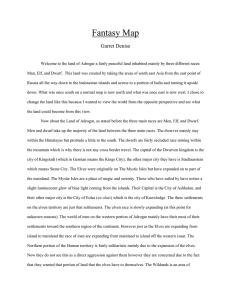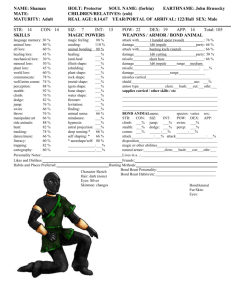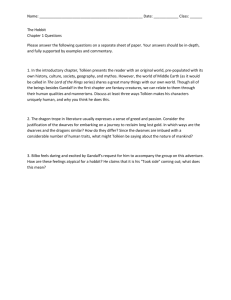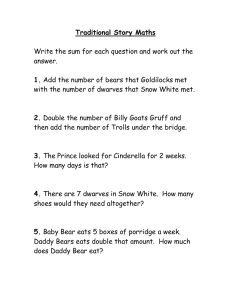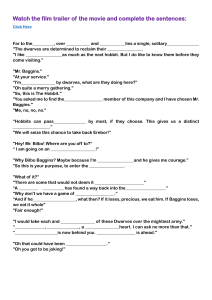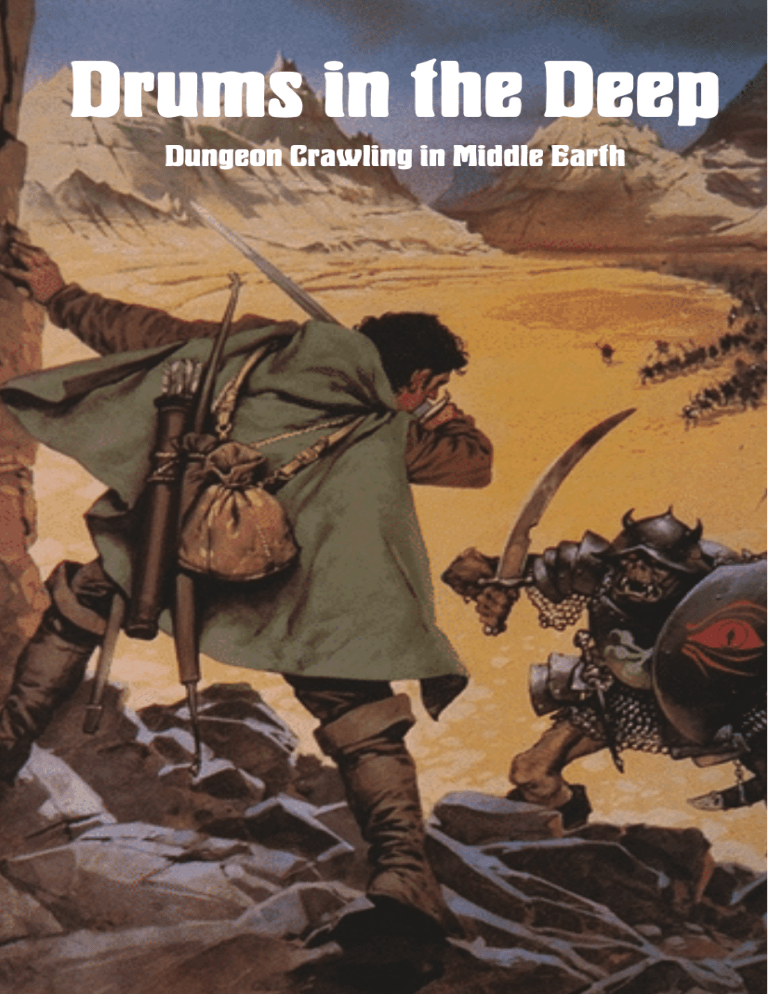
Drums in the Deep Dungeon Crawling in Middle Earth Introduction Drums in the Deep is my personal campaign using the Blue “Holmes” book version of Basic Dungeons & Dragons for adventuring in Middle Earth. The rules of Holmes D&D are used as the basis for the game, and only the character classes and tables provided in this supplement are used in place of the existing character classes in the Holmes version of the game. I think that this version of D&D lends itself very well to adventuring in Middle Earth, I have added some classes (and replaced the cleric with rangers) and expanded character levels to five. Character Creation Follow the rules provided by Holmes D&D to create your character. Roll 3d6 in order for your abilities (strength, intelligence, wisdom, constitution, dexterity, and charisma. The following should be used in place of the rules in Holmes D&D. Wisdom is the prime requisite for rangers. Rangers can perform miraculous spells even though they do not have special intelligence, and second level (experienced) rangers can heal wounds. If a character has a high wisdom score (13 and over) he would do well as a ranger. Constitution is a combination of health and endurance. It will influence how a character can withstand being paralyzed or killed and raised from the dead, etc. In addition, dwarves and hobbits have strong constitutions and a character should have a constitution great¬er than 9 to be a dwarf or a hobbit. Adjusting Ability Scores It is possible to raise a character's scores in a prime requisite by lowering the scores of some of the other abilities. This recognizes that one can practice and learn feats of fighting, intelligence, etc., but must take a penalty in another area by so doing. Magic-users and rangers can reduce their strength scores by 3 points and add 1 to their prime requisite for every 3. Fighting men, rangers, hobbits and dwarves can reduce their Intelligence score by 2 points and add 1 to their prime requisite for every 2. Fighting men, hobbits and dwarves can reduce their wisdom by 3 points, and magic-users can reduce it by 2 to gain 1 point for their prime requisites. Thieves can raise their dexterity score by lowering intelligence 2 points and wisdom 1 point for each additional point of dexterity. Constitution and charisma cannot be altered, and dexterity cannot be reduced. In no case can any ability be lowered below 9. Fighting Men Any human character can be a fighting man and all hobbits and dwarves are members of the fighter class, unless they opt to be thieves. Elves are a combination of fighting man and magic-user, as described later. Fighting men can use any weapon and wear any kind of armor including magic weapons and magic armor. They cannot do other kinds of magic, however. As they advance in experience they increase their "hit dice" and are harder to kill. After they reach the fourth level of experience they also increase their ability to get hits on an opponent. Dwarves Dwarves are about four feet tall, stocky of build and weigh 150 pounds, shoulders very broad, their skin a ruddy tan, brown or grey. They wear long beards. They are sturdy fighters and are especially resistant to magic as shown by their better saving throws against magical attack. They have infravision and can see 60 feet in the dark. Underground, they can detect slanting passages, traps, shifting wails and new construction about one-third of the time. They are the only ones who can wield the +3 Magic War Hammer (described later). Dwarves speak Khuzdul (the dwarvish language) as well as the Common tongue (Westron). Hobbits Hobbits are short, 3 feet high, little folk with several special abilities. Out-of-doors they are difficult to see, having the ability to vanish into woods or undergrowth. They are like dwarves in their resistance to magic. Hobbits are extremely accurate with missiles and fire any missile at +1. They can use all the weapons and armor of a fighting man as long as it is “cut down” to their size. Fighter Advancement Experience Points Level Hit Dice 0 1 1d8 2,001 2 +1d8 4,001 3 +1d8 8,001 4 +1d8 16,001 5 +1d8 Grey Elves Grey Elves (or Sindar) are tall, slim of build, and have fair to tan skin. They can use all the weapons and armor of the ighting man, including all magical weapons, and can also cast spells like a magic-user. Elves progress in level as both fighting men and magic-users, but since each game nets them experience in both categories equally, they progress more slowly than other characters. They can detect secret hidden doors about one-third of the time. They have infravision; like dwarves, they can see 60 feet in the dark. They are not paralyzed by the touch of ghouls. Grey Elves speak Sindarin and the Common tongue of Westron. High Elves High Elves (or Noldor) are the oldest and fairest of all Middle Earth. The Noldor are tall and lithe, with fair skin and silver, golden, or plat¬inum hair. They can wear any armor, and use any weapon, they also can cast spells as either a magic-user or a ranger. They are the masters of all classes, though it takes them longer to rise in level (but being immortal, what is the rush?). They have infravision; like dwarves, they can see 60 feet in the dark. They are not paralyzed by the touch of ghouls. High Elves speak Adunaic, Quenya, Sindarin, and the Common tongue of Westron. Grey Elf Advancement Magic-User Spells Experience Points Level Hit Dice 1 2 3 0 1 1d6 1 - - 4,501 2 +1d6 2 - - 9,001 3 +1d6 2 1 - 18,001 4 +1d6 3 2 1 36,001 5 +1d6 4 3 2 High Elf Advancement Experience Points Cleric Spells Magic-User Spells Level Hit Dice 1 2 1 2 3 0 1 1d6 - - 1 - - 5,501 2 +1d6 1 - 2 - - 11,001 3 +1d8 2 - 2 1 - 22,001 4 +1d6 2 1 3 2 1 44,001 5 +1d8 3 2 4 3 2 Magic-users Humans who elect to become magic-users cannot wear armor and may carry only a dagger or a staff for protection. They can, however, use all magical items, but not magical weapons (other than swords or daggers). They have the advantage (shared with Rangers and some elves) of being able to work magical spells. At the start, however, they can cast only one spell and must advance a level in experience before they can learn another. Thus the magic-user starts out as an extremely weak character, but if he survives and rises in experience, he becomes increasingly powerful. The types of spells and the way they are used are discussed in a later section. Magic-users, of course, may be good or evil, lawful or chaotic, and most of their spells remain the same. Rangers These are the last remnants of the Dunedain civilization. They are expert trackers and hunters and roam the wild lands protecting civilization from the horrors of the Dark Lord. They have ability to cast spells starting at 2nd level, and can track with ease. They can also “turn away” the undead servants of the Dark Lord. Rangers may only wear leather armor, but they may use any magic item (including scrolls) as they are well versed in the lore of Middle Earth. Rangers are never allowed to hire henchmen, though at 5th level they will gain a small cadre of loyal followers, Rangers must be Lawful. Magic-User Advancement Magic-User Spells Experience Points Level Hit Dice 1 2 3 0 1 1d6 1 - - 2,501 2 +1d4 2 - - 5,001 3 +1d4 2 1 - 10,001 4 +1d4 3 2 1 20,001 5 +1d4 4 3 2 Ranger Advancement Experience Points Cleric Spells Level Hit Dice 1 2 Tracking Ability 0 1 2d8 - - 4 in d6 2,301 2 +1d8 1 - 4 in d6 4,601 3 +1d8 2 - 5 in d6 9,201 4 +1d8 2 1 5 in d6 20,001 5 +1d8 3 2 6 in d6 Thieves Thieves are humans with special abilities to strike a deadly blow from behind, climb sheer surfaces, hide in shadows, filch items and pick pockets, move with stealth, listen for noises behind closed doors, pick locks and remove small traps such as poisoned needles. Every thief has these abilities, but as they progress in experience they become better and better at it. A table for determining whether a thief has ac¬complished one of these feats is given later. Thieves are not truly good and are usually referred to as neutral or evil, so that other members of an expedition should never completely trust them and they are quite as likely to steal from their own party as from the Dungeon Master’s monsters. Thieves can wear nothing stronger than leather armor and cannot carry shields. They can use all the weapons of a fighting man including magic swords and magic daggers. Thieves above the third level of experience can read magic scrolls and books and 80% of languages so that treasure maps, etc. are easy for them. Thief Advancement Experience Points Level Hit Dice 0 1 1d6 1,201 2 +1d6 2,401 3 +1d6 4,801 4 +1d6 9,601 5 +1d6 Final Steps Players decide what class they want their character to be and make any adjustments in prime requisite desired. Characters can be either male or female. The character's name, class, ability scores and other information is recorded by the player on a separate sheet of paper or other record. The player is responsible for keeping a record of the character's bonuses and penalties, any damage he takes, how much gold he owns, what weapons and other items he carries, etc. Gold owned by the character initially is determined by rolling three 6-sided dice and multiplying the result by 10. The result is the num¬ber of gold pieces owned. From this amount the character must outfit himself. Cost of Weapons & Equipment Selection of items is strictly up to the players, and gold pieces are taken away accordingly (players may sell to one another, of course, and then gold pieces would be transferred). Equipment List Item Arrows (20) Backpack Barding Battle Axe Cart Cost Item Cost 5 Pole Arm 7 5 Quiver /20 Arrows 10 Raft 40 Rations, Iron (1 week) 15 Rations, Standard (1 week) 5 150 7 100 Dagger 3 Rope (50’) 1 Draft Horse 30 Sack, Large 2 Flail 8 Sack, Small 1 Flask of Oil 2 Saddle 25 Hand Axe 3 Saddle Bags 10 Helmet 10 Shield 10 Iron Spikes (10) 1 Short Bow 25 Lance 4 Silver Tipped Arrow Lantern 10 Small Boat Leather Armor 15 Spear 2 Light Horse 40 Stakes & Mallet 3 Long Bow 40 Sword 10 Mace 5 Tinder Box 3 Mail Armor 30 Torches (6) 1 Mirror, Small Silver 15 Two Hand Sword 15 Mirror, Steel 5 Wagon 200 Morning Star 6 Warhorse, Heavy 200 Mule 20 Warhorse, Medium 100 Plate Armor 50 Waterskin 1 Pole (10’) 1 Wine, Quart 1 5 100 Languages The "common tongue" spoken through the lands is Westron, and is known by most humans, elves, dwarves, and hobbits. Characters with an Intelligence above 10 may learn additional languages, one language for every point above 10 in intelligence. Thus, a man with an intelligence level of 15 could speak six languages, i.e. Westron plus five others as selected. Magic-users spells and some magic items will enable the speaking and understanding of languages. Language Table Language Spoken By Adunaic Black Numenoreans, Corsairs, Dunedain, Noldor Elves Atliduk Beornings Black Speech Orcs, Folk of Mordor Dunael Dunlendings, Woses Khuzdul Dwarves Kuduk Hobbits Logathig Dorwinrim, Easterlings Nahaiduk Beornings, Woodmen Pukael Woses Quenya Dunedain, Noldor and Sindar Elves Sindarin Dunedain, Dwarves, Woodmen, All Elves Westron Common Tongue “It is grim reading,” he said. ‘I fear their end was cruel. Listen! We cannot get out. They have taken the Bridge and second hall. Frar and Loni and Nali fell there. Then there are four lines smeared so that I can only read went 5 days ago. The last lines run the pool is up to the wall at Westgate. The Watcher in the Water took Oin. We cannot get out. The end comes, and then drums, drums in the deep…
